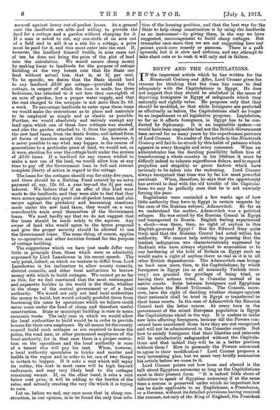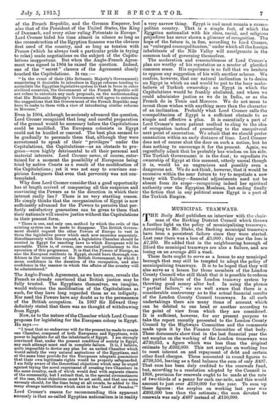EGYPT AND THE CAPITULATIONS.
IN the important article which he has written for the Nineteenth. Century and After, Lord Cromer gives his reasons for thinking that the time has come to deal adequately with the Capitulations in Egypt. He does not suggest that they should be abolished in the sense of depriving foreigners in Egypt of safeguards which they naturally and rightly value. He proposes only that they should be modified, so that while foreigners are protected as effectually as before, the Capitulations shall no longer be an impediment to all legislative progress. Legislation, so far as it affects foreigners, in Egypt has to be con- ducted by diplomacy. It is an impossible system—or would have been impossible had not the British Government been served for so many years by the superhuman patience of Lord Cromer. No reader of the article in the Nineteenth, Century will fail to be struck by this habit of patience which appears in every thought and every comment. When an administrator has the dazzling possibility before him of transforming a whole country in his lifetime it must be difficult indeed to tolerate superfluous delays, and to regard prejudice and stupidity as grave factors which have seriously to be taken into the reckoning. Lord Cromer always recognized that time was by far his most powerful assistant. When, therefore, he says that the opportunity has arrived to deal with the old trouble of the Capitula- tions we may be perfectly sure that he is not unwisely forcing the pace.
Englishmen were reminded a few weeks ago of how little authority they have in Egypt in certain respects by the case of the Russian subject, Adamovitch. So far as we understand the matter, Adamovitch was a political refugee. He was seized by the Russian Consul in Egypt and transported to Russia. English feeling experienced a shock—was there, then, no right of asylum in this English-governed Egypt ? But Sir Edward Grey quite truly said that the Russian Consul had acted within his authority. We cannot help noticing in passing that the loudest indignation was characteristically expressed by Radicals who have always objected to annexation or to any hardening of the hold of Britain on Egypt such as would make a right of asylum there as real as it is in all other British dependencies. The Adamovitch case brings us back once more, then, to the Capitulations, by which foreigners in Egypt (as in all nominally Turkish terri- tory) are granted the privilege of being tried, or having their actions tried, in Consular instead of in native courts. Suits between foreigners and Egyptians come before the Mixed Tribunals. The Consuls, more- over, have the right of deciding whether charges against their nationals shall be tried in Egypt or transferred to their home courts. In the case of Adamovitch the Russian Consul took the latter course. At every turn in the government of the mixed European population in Egypt the Capitulations stand in the way. It is useless to make new laws affecting foreigners, because till the Powers con- cerned have sanctioned those laws they are not recognized and will not be administered in the Consular courts. But how to satisfy foreigners that their liberties and interests will be satisfactorily safeguarded without the Capitula- tions and that indeed they will be in a better position without them ? How to persuade the Powers concerned to agree to their modification ? Lord Cromer proposes a very interesting plan, but we must very briefly summarize his article before we come to it.
Lord Cromer points out how loose and absurd is the talk about Egyptian autonomy so long as the Capitulations exist in their present form. " It is indeed little short of ridiculous to speak of Egyptian autonomy if at the same time a system is preserved under which no important law can be made applicable to an Englishman, a Frenchman, or a German, without its detailed provisions having received the consent, not only of the King of England, the President of the French Republic, and the German Emperor, but Also that of the President of the United States, the King of Denmark, and every other ruling Potentate in Europe." Lord Cromer bided his time almost in silence so long as the reconstruction of the Egyptian finances was the obvious first need of the country, and so long as tension with France (which he always took a particular pride in trying to relax) made negotiations on the subject of the Capitu- lations inopportune. But when the Anglo-French Agree- ment was signed in 1904 he raised the question. Indeed, one of the " secret " clauses of the Agreement closely touched the Capitulations. It ran :— " In the event of their (His Britannic Majesty's Government) considering it desirable to introduce in Egypt reforms tending to assimilate the Egyptian legislative system to that in force in other civilized countries, the Government of the French Republic will not refuse to entertain any such proposals, on the understanding that His Britannic Majesty's Government will agree to entertain the suggestions that the Government of the French Republic may have to make to them with a view of introducing similar reforms in Morocco."
Even in 1904, although he seriously advanced the question, Lord Cromer recognized that long and careful preparation of the ground would be necessary before the Capitulations could be modified. The European colonists in Egypt could not be hustled or coerced. The best plan seemed to be gradually to persuade them that, although they were accustomed to speak of their " privileges " under the Capitulations, the Capitulations—as an obstacle to pro- gress—were highly detrimental to all their personal and material interests. Lord Cromer never, of course, enter- tained for a moment the possibility of Europeans being tried by native Courts as a result of the modification of the Capitulations ; yet it was not easy to convince sus- picious foreigners that even that perversity was not con- templated.
Why does Lord Cromer consider that a good opportunity has at length arrived of conquering all this suspicion and convincing the Powers as to the direction in which their interest really lies ? There is no very startling reason. He simply thinks that the reorganization of Egypt is now sufficiently advanced for the Powers to perceive that per- fectly satisfactory guarantees can be given to them that their nationals will receive justice without the Capitulations in their present form.
" There is one, and only one, method by which the evils of the existing system can be made to disappear. The British Govern- ment should request the other Powers of Europe to vest in them the legislative power which each now exercises separately. Simultaneously with this request, a legislative Chamber should be created in Egypt for enacting laws to which Europeans will be amenable. There is, of course, one essential preliminary to the execution of this programme. It is that the Powers of Europe, as also the European residents in Egypt, should have thorough con- fidence in the intentions of the British Government, by which I mean confidence in the duration of the occupation, and also confidence in the manner in which the affairs of the country will be administered."
The Anglo-French Agreement, as we have seen, reveals the French as already convinced that British justice may be fully trusted. The Egyptians themselves, we imagine, would welcome the modification of the Capitulations as such, for they have long regarded them as an indignity. Nor need the Powers have any doubt as to the permanence of the British occupation. In 1907 Sir Edward Grey definitely stated that there was no thought of withdrawing from Egypt.
Now, as to the nature of the Chamber which Lord Cromer proposes for legislating for the European colony in Egypt. Ho says :— "I trust that no endeavour will for the present be made to create one Chamber, composed of both Europeans and Egyptians, with power to legislate for all the inhabitants of Egypt. I am strongly convinced that, under the present condition of society in Egypt, any such attempt must end in complete failure. It is, I believe, quite impossible to devise any plan for an united Chamber which would satisfy the very natural aspirations of the Egyptians, and at the same time provide for the Europeans adequate guarantees that their own legitimate rights would be properly safeguarded. I am fully aware of the theoretical objections which may be urged against trying the novel experiment of creating two Chambers in the same country, each of which would deal with separate classes of the community, but I submit that, in the special circumstances of the case, those objections must be set aside, and that one more anomaly should, for the time being at all events, be added to the many strange institutions which exist in the Land of Paradox."' Lord Cromer's reason for recommending this apparent anomaly is that so-called Egyptian nationalism is in reality 1 a very narrow thing. Egypt is and must remain a cosmo- politan country. That is a simple fact, of which the Egyiptian nationalist with his class, racial, and religious prejudices has never shown a glimmer of recognition. The hope of the future is, in fine, according to Lord Cromer, an"enlarged cosmopolitanism," under which all the foreign inhabitants of the Nile Valley will amalgamate in the common task of governing themselves.
The moderation and reasonableness of Lord Cromer's plan are worthy of his reputation as a master of glorified common sense. His experience is so full that we hesitate to oppose any suggestion of his with another scheme. Wo confess, however, that our natural inclination is to desire an Egypt in which an end would be put to the hazy make- believe of Turkish ownership ; an Egypt in which the Capitulations would be frankly abolished, and where we could administer justice as we do in India, or as the French do in Tunis and Morocco. We do not mean to invest these wishes with anything more than the character of an inclination. Probably what Lord Cromer calls the cosmpolitanism of Egypt is a sufficient obstacle to so simple and effective a plan. It is essentially a part of Lord Cromer's more patient method to cling to the idea of occupation instead of proceeding to the unequivocal next point of annexation. We admit that we should prefer annexation within an early distance of time. Lord Cromer does not of course shut the door on such a notion, but he does nothing to encourage it for the present. Again, we regretfully admit that he probably has wisdom on his side. The Turkish Government is in the dust; to repudiate its ownership of Egypt at this moment, utterly unreal thought it is, would be an ungracious and possibly even a dangerous act. We do not think, however, that it would be excessive within the near future to try to negotiate a new treaty with Turkey—financial adjustments need not be absent from its scope—recognizing indeed her spiritual authority over the Egyptian Moslems, but ending finally the fiction that in any political sense Egypt is a part of the Turkish Empire.



















































 Previous page
Previous page